– Corporate governance – Board of Directors
Board of Directors
Members of the Board of Directors are elected individually for one-year terms. At the AGM of April 14, 2021, Marco Musetti and Lukas Braunschweiler did not stand for re-election. All other members were re-elected, and Peter Löscher was re-elected as Chairman of the Board of Directors. In addition, Suzanne Thoma and David Metzger were elected as new members of the Board of Directors. The Board consists of eight members. None of them has ever held an executive position at Sulzer.
All members of the Board of Directors are non-executive. None of the members of the Board of Directors have ever belonged to the management of a Sulzer company or to the Executive Committee, nor do any significant business relationships exist between members of the Board of Directors and Sulzer Ltd or a subsidiary of Sulzer Ltd.
Elections and terms of office
The Articles of Association stipulate that the Board of Directors of Sulzer Ltd shall comprise five to nine members. Each member is elected individually. The term for members of the Board of Directors is one year. At the AGM of April 14, 2021, six Board members were re-elected to the Board of Directors, all for terms of one year. Marco Musetti and Lukas Braunschweiler did not stand for re-election. Suzanne Thoma and David Metzger were elected as additional members of the Board of Directors. The Board consists of eight members: two from Austria, one from Cyprus/Israel, one from Denmark, one from France/Switzerland, one from Russia and two from Switzerland. Professional expertise and international experience played a key role in the selection of the members. The members of the Board of Directors and their CVs can be viewed below.
According to the Board of Directors and Organization Regulations, the term of office of a Board member ends no later than on the date of the AGM in the year when the member reaches the age of 70. The Board of Directors can make exceptions up to but not exceeding the year in which the member reaches the age of 73.
Internal organization
The Board of Directors constitutes itself, except for the Chairman of the Board of Directors who is elected by the Shareholders’ Meeting. The Board of Directors appoints from among its members the Vice Chairman of the Board of Directors and the members of the board committees, except for the members of the Nomination and Remuneration Committee, who are elected by the Shareholders’ Meeting. There are currently three standing board committees (for their constitutions, see below):
- The Audit Committee (AC)
- The Nomination and Remuneration Committee (NRC)
- The Strategy and Sustainability Committee (SSC)
The Board of Directors and Organization Regulations and the relevant Committee Regulations, which are published at www.sulzer.com/governance (under “Regulationsˮ), define the division of responsibilities between the Board of Directors and the CEO. They also define the authorities and responsibilities of the Chairman of the Board of Directors and of the three standing board committees.
CVs of members of the Board of Directors
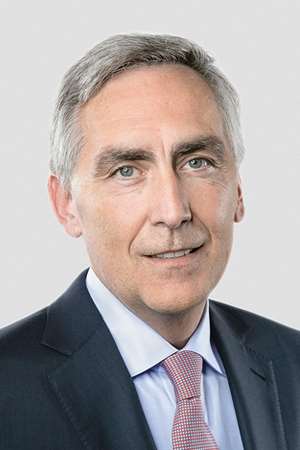
Peter Löscher
Chairman of the Board
Member of the Strategy and Sustainability Committee1)
Educational background
- Diploma in Economics, Vienna University of Economics and Business, Austria, and Chinese University of Hong Kong, China
- Advanced Management Program, Harvard University, USA
- Honorary professor at Tongji University Shanghai; honorary doctorate of Engineering from Michigan State University; doctor honoris causa of Slovak University of Engineering in Bratislava
Binding interests
- Member of the Board of Directors, Telefónica, Spain
- Chairman of the Supervisory Board, Telefónica Holding AG, Germany
- Member of the Board of Directors, TBG AG, Switzerland
- Member of the Board of Directors, Doha Ventures LLC, Qatar
- Member of the Supervisory Board, Royal Philips N.V., Netherlands
Career
Peter Löscher (born 1957, Austria) joined the Sulzer Board of Directors and was appointed Chairman of the Board of Directors in 2014. As of April 1, 2020, Peter Löscher joined the Supervisory Board of Telefónica Deutschland as Chairman. As of April 30, 2020, he further joined the Supervisory Board of Royal Philips as a Board member. From 2014 to 2016, he was CEO and Delegate of the Board of Directors of Renova Management AG Switzerland. Previously, he was President and CEO of the German company Siemens AG (2007–2013), Chairman of the Board of Trustees of Siemens Stiftung Germany (2008–2014) and served as President of Global Human Health and Member of the Executive Board of Merck & Co., Inc., USA (2006–2007). From 2004 to 2006, he was CEO of Healthcare Bio-Sciences and Member of the Corporate Executive Council of General Electric in the US. He was COO and Member of the Board of Amersham plc., UK (2002–2004). From 1999 to 2002, he acted as Chairman and CEO of Aventis Pharma Ltd in Japan. He held various senior leadership positions with Hoechst Group in Germany, Spain, the US, and the UK (1987–1999).
1) Peter Löscher was Chairman of the SSC until April 14, 2021
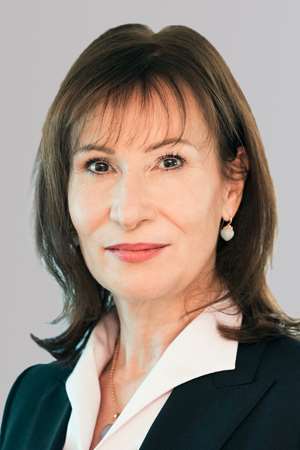
Dr. Suzanne Thoma1)
Vice Chairwoman of the Board
Member of the Nomination and Remuneration Committee
Educational background
- Ph.D. in Technical Sciences, ETH Zurich, Switzerland
- Master of Science degree in Chemical Engineering, ETH Zurich, Switzerland
- Bachelor’s degree in Business Administration, Graduate School of Business Administration (GSBA), Zurich, Switzerland
Binding interests
- Member of the Board of Directors, OC Oerlikon2), Switzerland
- Vice President of the foundation “Avenir Suisse”, Switzerland
Career
Dr. Suzanne Thoma (born 1962, Switzerland) was elected as member of Sulzer’s Board of Directors in 2021. She is CEO of BKW AG, Berne, Switzerland (stepping down in the course of 2022). Prior to being appointed CEO of BKW in 2013, she was a member of the Group Executive Committee of BKW, responsible for the Networks division. Before that, she was head of the Automotive division of the WICOR Group, Rapperswil-Jona, Switzerland, and CEO of Rolic Technologies Ltd., Allschwil, Switzerland. Suzanne Thoma also served in various management roles and countries at Ciba Specialty Chemicals Ltd. (now BASF).
1) since April 14, 2021
2) will not stand for re-election at the AGM 2022 of OC Oerlikon
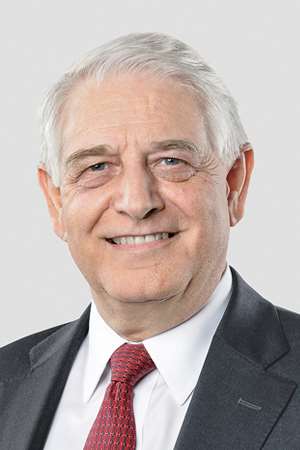
Matthias Bichsel
Member of the Board, (Vice Chairman1))
Chairman of the Strategy and Sustainability Committee2)
Educational background
- Ph.D. in Earth Sciences, University of Basel, Switzerland
- Honorary professor, Chinese University of Petroleum, China
Binding interests
- Member of the Board of Directors, Petrofac, UK
- Member of the Advisory Board, Chrysalix EVC, Canada
- Member of the Board of Directors, Canadian Utilities Ltd, Canada
- Member of the Board of Directors, Southpole Holding, Switzerland
- Member of the Board of Directors, Voliro AG, Switzerland
Career
Matthias Bichsel (born 1954, Switzerland) joined the Sulzer Board of Directors in 2014. Currently, he is member of the Board of Directors of Petrofac, UK (since 2015), member of the Board of Directors of South Pole Holding, Switzerland (since 2015), member of the Board of Directors of Canadian Utilities, Canada (since 2014), member of the Board of Directors of Voliro AG, Switzerland (since 2021) and member of the Advisory Board of Chrysalix EVC, Canada (since 2015). From 2009 to 2014, he was member of the Executive Committee of Royal Dutch Shell plc and Director of its Projects and Technology Business, the Netherlands. Previously, during his international career with Shell since 1980, he served in various senior management roles such as Executive Vice President in Exploration and Production, the Netherlands, CEO/Chairman of Shell International Exploration and Production Inc and Managing Director of Shell Deepwater Services, Houston, TX, USA.
1) until April 14, 2021
2) since April 14, 2021
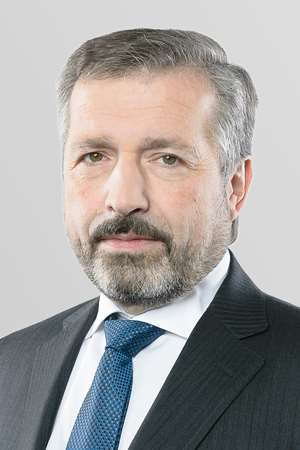
Mikhail Lifshitz
Member of the Board
Member of the Strategy and Sustainability Committee
Educational background
- Graduate degree in Electronic Engineering, Bauman Moscow State Technical University, Russia
- Honorary Power Engineer, Mongolia
- Honorary Mechanical Engineer, Russia
Binding interests
- Chairman of the Board of Directors, Rotec, Russia
- Chairman of the Board of Directors, Ural Turbine Works, Russia
- Chairman of the Board of Directors, TEEMP, Russia
- Member of the Board of Directors, SOLIDpower S.p.a., Italy
- Member of the Board of Directors, Hevel, Russia
- Member of the Board of Directors, VoltAero, France
Career
Mikhail Lifshitz (born 1963, Russia) joined the Sulzer Board of Directors in 2016. From 2009 to 2011, he was High-Tech Assets Development Director of Renova Group and CEO (2009–2015) as well as Chairman of the Board of Directors (since 2015) of ISC Rotec. Furthermore, he has chaired the Board of Directors of Ural Turbine Works (since 2012), and served as member of the Board of Directors of Oerlikon AG (2013–2016). Previously, he was Founder and President of the Global Edge Group (2001–2009) and Marketing Director.
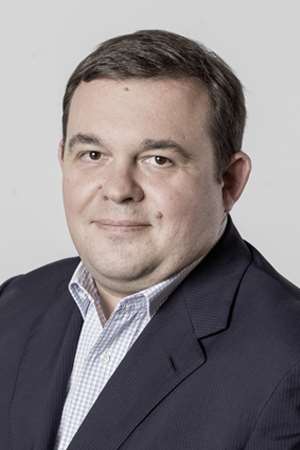
Alexey Moskov
Member of the Board
Member of the Audit Committee
Educational background
- Master’s degree in Software Engineering/Developing from the Moscow State University of Railway Engineering, Russia
Binding interests
- Executive Chairman, Witel Ltd (formerly Renova Management Ltd), Switzerland
- Member of the Board of Directors, OC Oerlikon, Switzerland
- President of the Board of Directors, Liwet Holding AG, Switzerland (as of 2022)
Career
Alexey Moskov (born 1971, Russia, Cyprus and Israel) was elected as new member of the Sulzer Board of Directors in 2020. As of 2022, he is President of the Board of Directors of Liwet Holding AG. Since 2018, Alexey Moskov is Executive Chairman of Witel Ltd, Switzerland. Since 2016 he has been a member of the Board of Directors of OC Oerlikon and since 2019 of Swiss Steel Holding. From 2004 to 2018, he was Chief Operating Officer of Renova Management AG, Switzerland. Previously, he served as Vice-President and member of the Executive Board at Tyumen Oil Company (now TNK-BP), Russia, and as member of the Board of Directors of OAO NGK Slavneft, Russia (1998–2004).
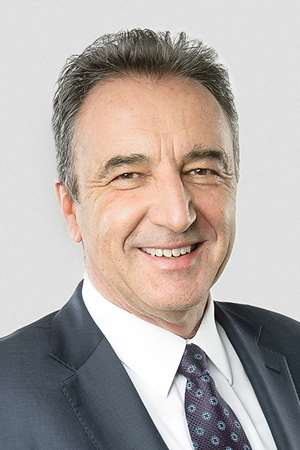
Gerhard Roiss
Member of the Board
Chairman of the Nomination and Remuneration Committee
Member of the Audit Committee
Educational background
- PhD in Economics, Johannes Kepler University of Linz, Austria
Career
Gerhard Roiss (born 1952, Austria) joined the Sulzer Board of Directors in 2015. He served as Chief Executive Officer and Chairman of the Executive Board of OMV AG (2011–2015). During more than two decades, he has held a variety of leadership positions within OMV AG. Among other functions, he has led the Refining and Marketing division (2002–2011), the Exploration and Production division (2000–2002), and the Chemicals and Plastics division (1997–2002). He was Chairman of the Supervisory Board of Petrol Ofisi A.S., Istanbul, Turkey (2010–2015), Chairman of the Supervisory Board of OMV Petrom S.A., Bucharest, Romania (2011–2015), and Chairman/Vice Chairman of the Board of Borealis AG, Vienna, Austria (1997–2011).
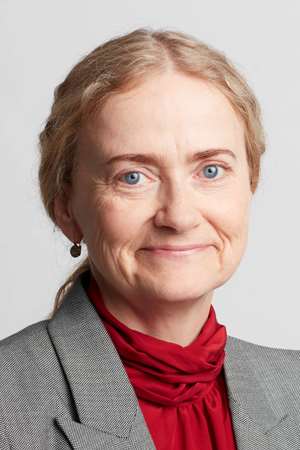
Hanne Birgitte Breinbjerg Sørensen
Chairwoman Audit Committee
Member of the Nomination and Remuneration Committee
Educational background
- MSc in Economics and Management, University of Aarhus, Denmark
Binding interests
- Member of the Board of Directors, Tata Motors Ltd., India
- Member of the Board of Directors, Ferrovial S.A., Spain
- Member of the Board of Directors, Holcim Ltd., Switzerland
- Member of the Board of Directors, Jaguar Land Rover Automotive PLC, United Kingdom
- Member of the Board of Directors, Tata Consultancy Services Ltd., India
Career
Hanne Birgitte Breinbjerg Sørensen (born 1965, Denmark) joined the Sulzer Board of Directors in 2018. In 2017, she was interim CEO of V.Group Limited, the world’s largest ship management and marine service company headquartered in London. From 1994 to 2016, she held various positions within the A.P.Moller — Maersk A/S Group in Denmark, a conglomerate of several companies primarily within the energy and transportation industry: CEO of Damco, the Netherlands (2014–2016), CEO of Maersk Tankers, Denmark (2012–2013), Senior VP and Chief Commercial Officer of Maersk Line, Denmark (2008–2012)
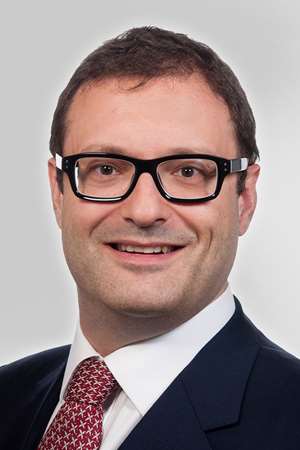
David Metzger2)
Member of the Board
Member of the Audit Committee
Educational background
- Master of Business Administration from INSEAD Business School
- Master of Finance (lic. oec. publ.), University of Zurich
Binding interests
- Member of the Board of Directors, Swiss Steel Holding AG, Switzerland
- Member of the Board of Directors, Octo Telematics, Italy
Career
David Metzger (born 1969, Switzerland and France) was elected as member of Sulzer’s Board of Directors in 2021. He has significant experience as a board member of private and public companies. He is currently Managing Director Investments and Portfolio Manager for Liwet Holding AG. Prior to this David held senior positions in Witel AG, and previously the Renova Group, as Deputy Managing Director M&A and Strategic Investment at Renova Management AG, and Chief Financial Officer of Venetos Management AG (part of the Renova Group). Prior to this, he held various roles at Good Energies Inc., Bain & Company, Novartis, and Morgan Stanley.
2) since April 14, 2021
Operating principles of the Board of Directors and its committees
All decisions are made by the full Board of Directors. For each application, written documentation is distributed to the members of the Board of Directors prior to the meeting. The Board of Directors and the committees meet as often as required by the circumstances. The Board of Directors meets at least five times per year, the Audit Committee and the Nomination and Remuneration Committee meet at least three times per year, and the Strategy and Sustainability Committee meets at least twice per year. In 2021, the Board held three half-day meetings, one conference call for the constitution of the Board after the AGM and eight conference calls lasting 10 to 180 minutes. For further details, see the table below. The CEO, the CFO and the Group General Counsel (who is the Secretary of the Board of Directors) also generally attend the Board meetings in an advisory role. Other members of the Executive Committee are invited to attend Board meetings as required to discuss the midterm planning, the strategy and the budget, as well as division-specific items (such as large investments and acquisitions).
The committees do not make any decisions, but rather review and discuss the matters assigned to them and submit the required proposals to the full Board of Directors for a decision. At the next full Board meeting following the committee meeting, the Chairpersons of the committees report to the full Board of Directors on all matters discussed, including key findings, opinions and recommendations.
Board of Directors
|
|
|
|
|
|
|
|
|
|
|
Attending meetings of the |
||||||
|
Name |
|
Nationality |
|
Position |
|
Entry |
|
Elected until |
|
Board |
|
AC |
|
NRC |
|
SSC |
|
Peter Löscher |
|
Austria |
|
Chairman, Chairman SSC 1) /member SSC 2) |
|
March 2014 |
|
2022 |
|
12 |
|
- |
|
- |
|
3 |
|
Matthias Bichsel |
|
Switzerland |
|
Vice Chairman of the Board 1) , member SSC 1) / Chairman SSC 2) |
|
March 2014 |
|
2022 |
|
11 |
|
- |
|
- |
|
3 |
|
Lukas Braunschweiler 1) |
|
Switzerland |
|
Member SSC |
|
April 2018 |
|
2022 |
|
2 |
|
- |
|
- |
|
1 |
|
Mikhail Lifshitz |
|
Russia |
|
Member SSC |
|
April 2016 |
|
2022 |
|
12 |
|
- |
|
- |
|
3 |
|
David Metzger 2) |
|
Switzerland / France |
|
Member AC |
|
April 2021 |
|
2022 |
|
10 |
|
5 |
|
- |
|
1 (guest) |
|
Alexey Moskov |
|
Cyprus / Israel |
|
Member AC |
|
April 2020 |
|
2022 |
|
11 |
|
5 |
|
- |
|
1 (guest) |
|
Marco Musetti 1) |
|
Italy / Switzerland |
|
Member NRC, member AC |
|
April 2011 |
|
2022 |
|
3 |
|
1 |
|
2 |
|
1 (guest) |
|
Gerhard Roiss |
|
Austria |
|
Chairman NRC, member AC |
|
April 2015 |
|
2022 |
|
12 |
|
4 |
|
10 |
|
2 (guest) |
|
Hanne Birgitte Breinbjerg Sørensen |
|
Denmark |
|
Chairwoman AC, member NRC |
|
April 2018 |
|
2022 |
|
10 |
|
6 |
|
10 |
|
2 (guest) |
|
Suzanne Thoma 2) |
|
Switzerland |
|
Vice Chairwoman of the Board, member NRC, member SSC |
|
April 2021 |
|
2022 |
|
10 |
|
- |
|
8 |
|
2 |
AC = Audit Committee, NRC = Nomination and Remuneration Committee, SSC = Strategy and Sustainability Committee
1) Until April 14, 2021.
2) From April 14, 2021
Additional mandates of members of the Board of Directors outside the Sulzer group
According to Sulzer’s Articles of Association (published at www.sulzer.com/governance, under “Articles of Associationˮ), the maximum number of additional mandates held by members of the Board of Directors outside the Sulzer group is ten (of which a maximum of four mandates may be with listed companies) (Art. 33). Exceptions (e.g. for mandates held at the request of Sulzer or mandates in charity organizations) are defined in the Articles of Association (§ 33 paragraphs a, b and c).
Audit Committee
The Audit Committee (members listed above) assesses the midyear and annual consolidated financial statements and, in particular, the activities — including effectiveness and independence — of the internal and statutory auditor, as well as the cooperation between the two bodies. It also assesses the Internal Control System (ICS), risk management and compliance; at least one meeting per year is dedicated to risk management and compliance. The regulations of the Audit Committee can be viewed at www.sulzer.com/governance (under “Regulationsˮ). The CEO, the CFO, the Group General Counsel (at least partially), the Head of Group Internal Audit (who is also the Secretary of this committee) and the external auditor-in-charge attend the meetings of the Audit Committee. In 2021, the Audit Committee held four regular meetings, in February, July, September and December. The meetings lasted on average between two and two and a half hours. In addition, two extraordinary meetings took place in August and October, which on average lasted 20 minutes. The statutory auditor attended all of these meetings. Internal experts, such as the Group General Counsel and the Heads of Group Internal Audit, Group Treasury, Group Accounting, Group IT, Group Compliance and Risk Management, and Group Tax gave presentations to the Audit Committee in 2021. In February, the Audit Committee is informed of compliance exposures as a result of periodic risk assessments, and it receives an overview of compliance cases under investigation. In September, the Audit Committee is briefed on the present state of risk management within the company and on the results of the risk management process — a process to systematically identify and evaluate significant risks and introduce countermeasures. In the same meeting, an update on Sulzer’s compliance approach, including the respective ongoing — and planned — activities, is provided. The major current compliance cases (if any) are reported to and discussed by the Audit Committee regularly.
Nomination and Remuneration Committee1)
The Nomination and Remuneration Committee (members listed above) assesses the criteria for the election and re-election of Board members and the nomination of candidates for the top two management levels and deals with succession planning. It also assesses the compensation systems and recommends compensation for the members of the Board of Directors and the Executive Committee (including bonus targets for the latter) on behalf of the Board of Directors and in accordance with its specifications. It carries out broadly based compensation benchmarks with an international comparison group, supported by studies of consulting firms such as Mercer and Willis Towers Watson, and it scrutinizes the work of internal and external consultants. The members of the Nomination and Remuneration Committee are elected by the Shareholders’ Meeting. The regulations of the Nomination and Remuneration Committee are available at www.sulzer.com/governance (under “Regulationsˮ). The CEO and the Chief Human Resources Officer (who is also the Secretary of this committee) attend the meetings of the Nomination and Remuneration Committee. In 2021, four regular meetings were held in January, July, September and December, taking on average two hours. Furthermore, the NRC held six extraordinary meetings by conference call, lasting on average 60 minutes. Independent third-party market compensation data was provided to the NRC, especially by Mercer with respect to executive management’s remuneration.
1) The Board of Directors intends to split the Nomination and Remuneration Committee into two separate committees after the 2022 AGM: a Nomination and a Remuneration Committee. The members of the Remuneration Committee will continue to be elected by the AGM.
Strategy and Sustainability Committee
To effectively govern Sulzer’s sustainability agenda, the Board of Directors decided to extend the scope of the Strategy Committee and to rename it the Strategy and Sustainability Committee as of April 15, 2020. The Strategy and Sustainability Committee (members listed above) advises the Board of Directors on strategic matters (such as material acquisitions, divestitures, alliances and joint ventures), strategic planning, definition of development priorities, and the company’s sustainability initiatives and objectives as well as on other relevant public policy matters. The regulations of the Strategy and Sustainability Committee can be viewed at www.sulzer.com/governance (under “Regulationsˮ). In 2021, three meetings (one regular, two via conference call) took place in February, May and October, lasting one and a half to two and a half hours.
Division of powers between the Board of Directors and the CEO
The Board of Directors has largely delegated executive management powers to the CEO. However, it is still responsible for matters that cannot be delegated in accordance with Art. 716a of the Swiss Code of Obligations. These matters include corporate strategy, the approval of midterm planning and the annual budget, as well as key personnel decisions and the preparation of the compensation report. The same applies to acquisition and divestiture decisions involving a transaction value exceeding CHF 30 million, investments in fixed assets exceeding CHF 15 million, major corporate restructurings, approval of dispute settlements with an impact on operating income of more than CHF 20 million, approval of research and development projects exceeding CHF 10 million, as well as other matters relevant to the company, and decisions that must be made by law by the Board of Directors. The competency regulations and the nature of the collaboration between the Board of Directors and the Executive Committee can be viewed in the organizational regulations at www.sulzer.com/governance (under “Regulationsˮ).
Information and control instruments
Each member of the Board of Directors receives a copy of the monthly financial information (January to May and July to November), plus the midyear and annual financial statements. These include information about the balance sheet, the income and cash flow statements, and key figures for the company and its divisions. They incorporate comments on the respective business results and a rolling forecast for the current business year. The CEO and CFO report at every Board meeting on business developments and all matters relevant to the company; once each year, the Board receives the forecasted annual results. During these Board meetings, the Chairs of the committees also report on all matters discussed by their committees and on the key findings and assessments, and they submit proposals accordingly. Each year, the Board of Directors discusses and approves the budget for the following year and the midterm plan, which is also subject to periodic review. The Chairman of the Board of Directors regularly consults with the CEO and other representatives of the Executive Committee. In addition, the Board of Directors receives a status update on investor relations on a regular basis.
Group Internal Audit
Group Internal Audit reports functionally directly to the Chair of the Audit Committee, but administratively to the CFO. Meetings between Group Internal Audit and the statutory auditor take place regularly. They are used to prepare for the meetings of the Audit Committee, to review the interim and final reports of the statutory auditor, and to plan and coordinate internal and external audits. Group companies are audited by Group Internal Audit based on an audit plan that is approved by the Audit Committee. Depending on the risk category, such audits are carried out on a rotational basis either annually or every second, third or fourth year. Group Internal Audit carried out 36 audits in the year under review. One of the focal points is the Internal Control System (ICS). The results of each audit are discussed in detail with the companies and (where necessary) the divisions concerned, and key measures are agreed upon. The Chairman of the Board of Directors, the members of the Audit Committee, the CEO, the CFO, the Group General Counsel as well as the respective Division President and other line managers of the audited entity receive a copy of the audit report. Significant findings and recommendations are also presented to and discussed with the Executive Committee and the Group General Counsel during the monthly Executive Committee meetings. A follow-up process is in place for all group internal audits, which allows efficient and effective monitoring of how the improvement measures are being implemented. Each year, the Head of Group Internal Audit compiles a report summarizing activities and results. This report is distributed to members of the Board of Directors and the members of the Executive Committee, and it is presented to the Executive Committee and the Audit Committee. It is discussed in both committees and, thereafter, reported to the Board of Directors.
Risk management and compliance
Sulzer has established and implemented a comprehensive, value- and risk-based compliance program that focuses on prevention, detection and response. It consists of the following main elements:
Strong values and building up a strong ethical and compliance culture
Sulzer puts a high priority on conducting its business with integrity, in compliance with all applicable laws and internal rules (“a clean deal or no dealˮ), and on accepting only reasonable risks. Sulzer follows a “zero-toleranceˮ compliance approach. The Board of Directors and the Executive Committee are convinced that compliant and ethical behavior in all aspects and on all levels is a precondition for successful and sustainable business. The ethical tone is set at the top, carried through to the middle, and is transmitted to the entire organization. Sulzer also fosters a speak-up culture and encourages employees to address potentially non-compliant behaviors. Retaliation against whistleblowers acting in good faith will not be tolerated.
Risk assessment
As part of Sulzer’s integrated risk management process, compliance risks are assessed regularly and mitigated with appropriate and risk-based actions. The results are discussed both with the management and with the Audit Committee. The Audit Committee dedicates at least one full meeting per year to risk management and compliance. An overview of the main risks and corresponding mitigation measures is provided in the chapter “Risk management” of this corporate governance report.
Internal rules and tools
Sulzer has a Code of Business Conduct, which can be viewed in 18 languages at www.sulzer.com/governance (under “Code of Business Conductˮ). Every employee of the company (including employees of newly acquired businesses) has to confirm in writing that he or she has read and understood this code, and will comply with it. Every member of the Sulzer Management Group (approximately 70 managers), the heads of the operating companies, the headquarters, regional and local compliance officers as well as the legal entity finance heads must reconfirm this compliance commitment in writing annually. Furthermore, Sulzer joined the UN Global Compact initiative in 2010. The latest Communication on Progress Report was published on September 10, 2021, and can be downloaded from www.sulzer.com/sustainability.
Rules
Although Sulzer follows a behavior- and principle-based approach, compliance directives and processes have been implemented as elements of the governance framework. Sulzer focuses on the major compliance risks, e.g.:
- Bribery and corruption risks: Sulzer has had a group-wide anti-bribery and anti-corruption program in place since 2010. This program includes a web-based process that addresses the due diligence of intermediaries, a company-wide directive for offering and receiving gifts and hospitalities, and an e-training module (in thirteen languages) to familiarize Sulzer employees with the requirements of the directive.
- Antitrust and anticompetition risks: Sulzer has an antitrust directive addressing behaviors in trade associations in place.
- Export control risks: Employees involved in export activities have to comply with all applicable export and re-export laws and regulations. Sulzer rolled out and implemented its global Trade Control Directive in all legal entities concerned. Every exporting legal entity has an internal control program (ICP) in place that includes processes and defines responsibilities on export control matters and other important requirements to comply with export compliance laws and regulations.
- Further risks (e.g. non-compliance with stock exchange laws and regulations; human resource–related issues; insufficient protection of intellectual property and know-how; violations of privacy and data protection laws; product liability; risk related to environment, quality, safety and health, etc.): Focused rules and processes address these and many other potential risks. Sulzer has processes that ensure compliance with insider laws as well as stock exchange reporting and notification duties. Local compliance officers performed 10 face-to-face compliance training sessions. Due to the COVID-19 preventive measures, face-to-face sessions have been replaced by 21 compliance webinars, conducted by Group Compliance and covering 2’610 employees. In addition, 34 export control trainings have been provided.
Tools
Sulzer has a compliance hotline and an incident reporting system that provides employees with one of many options for reporting (potential) violations of laws or internal rules. Reports can be made anonymously or openly via a free hotline or a dedicated website. The company has a directive that sets clear rules for internal investigations. Further tools are available to all employees on Sulzer’s intranet (e.g. presentations addressing the major exposures, draft agreements, sales and procurement handbooks with compliance-specific explanations and standard clauses). Sulzer has a compliance risk assessment process in place to identify and assess potential compliance risks on a local entity level and to define appropriate measures. For newly acquired companies, Sulzer sets up a post-merger integration process consisting of a systematic post-merger compliance risk analysis, which provides the foundation for risk-based mitigation actions.
Organization
Since 2013, Sulzer has had a Legal, Compliance and Risk Management group function (headed by the Group General Counsel). Within this organization, a line reporting structure is in place for the three regions: Americas (AME); Europe, the Middle East and Africa (EMEA); and Asia-Pacific (APAC). The local Compliance Officers ultimately report — via Regional Compliance Officers and the Chief Compliance Officer — to the Group General Counsel. In addition, the headquartered Compliance and Risk Management team steers and runs the group-wide compliance program and all compliance investigations. To ensure the consistent rollout of Group Compliance initiatives, the compliance organization uses direct reporting lines. The Group General Counsel informs the Board of Directors and the Executive Committee regularly about legal matters and key changes in legislation that may affect Sulzer, as well as on important litigation. Twice a year, the Audit Committee receives a report about any pending or threatened litigation with worst-case exposure exceeding CHF 0.5 million. Further information on reports to the Audit Committee is provided in the “Audit Committeeˮ section above.
Awareness building and trainings
Sulzer puts substantial effort into training its employees. Training is carried out through e-learning programs (new programs are rolled out and existing programs are updated every year), in person or through web conferences. In 2021, Sulzer employees completed 22’051 compliance e-learning courses.
Controls and sanctions
The Group Function Legal supports the audits done by Group Internal Audit following the same audit process. The Group Function Environment, Safety and Health (ESH) organized 10 external health and safety compliance audits. The focal points were occupational health and safety compliance with applicable regulations. The results of each of these audits were discussed directly with the responsible managers, and an agreement was reached on any improvements required. Audit actions are reported in a central repository (group tool) that enables the follow-up and tracking of closures and is regularly reviewed by management. The latest status of the company’s risks relating to environment, safety and health is reported to the Audit Committee once a year. Apart from these formal audits, internal investigations (triggered by reports from the compliance hotlines, e-mails, telephone calls or other avenues of communication) were carried out during 2021 and at least five employees had to leave Sulzer because of violations of Sulzer’s Code of Business Conduct. Others received warnings or faced other disciplinary measures. However, most of the reports received concerned non-material issues.
Continuous improvement
It is Sulzer’s goal to constantly improve its compliance and risk management approach. Findings of audits and internal investigations are assessed, internal processes and rules are adjusted, and training modules are improved. Sulzer always reviews compliance violations to determine whether they are rooted in a process weakness. If that is found to be the case, the process will be improved and risk-mitigating measures will be taken.